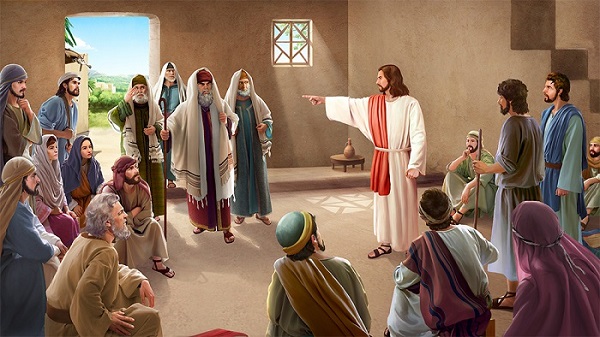Post by The Ambassador on Jun 28, 2019 18:49:57 GMT
Jesus Rebukes the Pharisees


By denying that Jesus expels demons with God’s power, the scribes and Pharisees are at risk of blaspheming the holy spirit. Hence, whose side will they take—God’s or Satan’s? Jesus says: “Either you make the tree fine and its fruit fine or make the tree rotten and its fruit rotten, for by its fruit the tree is known.”—Matthew 12:33.
A tree branch with fruit on it

It is foolish to charge that the good fruit of casting out demons results from Jesus’ serving Satan. As Jesus made plain in his Sermon on the Mount, if the fruit is fine, the tree is fine, not rotten. So, what does the Pharisees’ fruit, their absurd accusations against Jesus, prove? That they are rotten. Jesus tells them: “Offspring of vipers, how can you speak good things when you are wicked? For out of the abundance of the heart the mouth speaks.”—Matthew 7:16, 17; 12:34.
Yes, our words reflect the condition of our hearts and provide a basis for judgment. Hence, Jesus says: “I tell you that men will render an account on Judgment Day for every unprofitable saying that they speak; for by your words you will be declared righteous, and by your words you will be condemned.”—Matthew 12:36, 37.
Despite the powerful works Jesus is doing, the scribes and Pharisees demand more: “Teacher, we want to see a sign from you.” Whether they have personally seen him perform miracles or not, there is ample eyewitness testimony of what he is doing. Jesus can thus tell those Jewish leaders: “A wicked and adulterous generation keeps on seeking a sign, but no sign will be given it except the sign of Jonah the prophet.”—Matthew 12:38, 39.
A big fish swallows Jonah

Jesus does not leave them to wonder about what he means: “Just as Jonah was in the belly of the huge fish for three days and three nights, so the Son of man will be in the heart of the earth for three days and three nights.” Jonah was swallowed by some sort of huge fish but then came out as if resurrected. Jesus thus foretells that he himself will die and on the third day be raised. When that later occurs, the Jewish leaders reject “the sign of Jonah,” refusing to repent and change. (Matthew 27:63-66; 28:12-15) In contrast, the “men of Nineveh” did repent after Jonah preached to them. So they will condemn this generation. Jesus also says that by her example, the queen of Sheba will likewise denounce them. She desired to hear Solomon’s wisdom and marveled at it. Now, Jesus notes, “something more than Solomon is here.”—Matthew 12:40-42.
Jesus likens the situation of this wicked generation to a man from whom an unclean spirit comes out. (Matthew 12:45) Because the man does not fill the void with good things, the wicked spirit returns with seven spirits more wicked than himself and they possess him. Comparably, the Israelite nation had been cleansed and had reformed—much like the man from whom the unclean spirit came out. But the nation rejected God’s prophets, culminating in its opposing this one who clearly has God’s spirit, Jesus. This shows the nation’s condition to be worse than at its start.
While Jesus is speaking, his mother and his brothers arrive and stand at the edge of the crowd. Some sitting near him say: “Your mother and your brothers are standing outside, wanting to see you.” Jesus then shows how close he feels to his disciples, who are like real brothers, sisters, and mothers to him. Extending his hand toward his disciples, he says: “My mother and my brothers are these who hear the word of God and do it.” (Luke 8:20, 21) He thus shows that regardless of how precious the ties are that bind him to his relatives, his relationship with his disciples is even more precious. How refreshing it is for us to have such closeness with our spiritual brothers, especially when others doubt us or reproach us and our good works!
A tree branch with fruit on it

It is foolish to charge that the good fruit of casting out demons results from Jesus’ serving Satan. As Jesus made plain in his Sermon on the Mount, if the fruit is fine, the tree is fine, not rotten. So, what does the Pharisees’ fruit, their absurd accusations against Jesus, prove? That they are rotten. Jesus tells them: “Offspring of vipers, how can you speak good things when you are wicked? For out of the abundance of the heart the mouth speaks.”—Matthew 7:16, 17; 12:34.
Yes, our words reflect the condition of our hearts and provide a basis for judgment. Hence, Jesus says: “I tell you that men will render an account on Judgment Day for every unprofitable saying that they speak; for by your words you will be declared righteous, and by your words you will be condemned.”—Matthew 12:36, 37.
Despite the powerful works Jesus is doing, the scribes and Pharisees demand more: “Teacher, we want to see a sign from you.” Whether they have personally seen him perform miracles or not, there is ample eyewitness testimony of what he is doing. Jesus can thus tell those Jewish leaders: “A wicked and adulterous generation keeps on seeking a sign, but no sign will be given it except the sign of Jonah the prophet.”—Matthew 12:38, 39.
A big fish swallows Jonah

Jesus does not leave them to wonder about what he means: “Just as Jonah was in the belly of the huge fish for three days and three nights, so the Son of man will be in the heart of the earth for three days and three nights.” Jonah was swallowed by some sort of huge fish but then came out as if resurrected. Jesus thus foretells that he himself will die and on the third day be raised. When that later occurs, the Jewish leaders reject “the sign of Jonah,” refusing to repent and change. (Matthew 27:63-66; 28:12-15) In contrast, the “men of Nineveh” did repent after Jonah preached to them. So they will condemn this generation. Jesus also says that by her example, the queen of Sheba will likewise denounce them. She desired to hear Solomon’s wisdom and marveled at it. Now, Jesus notes, “something more than Solomon is here.”—Matthew 12:40-42.
Jesus likens the situation of this wicked generation to a man from whom an unclean spirit comes out. (Matthew 12:45) Because the man does not fill the void with good things, the wicked spirit returns with seven spirits more wicked than himself and they possess him. Comparably, the Israelite nation had been cleansed and had reformed—much like the man from whom the unclean spirit came out. But the nation rejected God’s prophets, culminating in its opposing this one who clearly has God’s spirit, Jesus. This shows the nation’s condition to be worse than at its start.
While Jesus is speaking, his mother and his brothers arrive and stand at the edge of the crowd. Some sitting near him say: “Your mother and your brothers are standing outside, wanting to see you.” Jesus then shows how close he feels to his disciples, who are like real brothers, sisters, and mothers to him. Extending his hand toward his disciples, he says: “My mother and my brothers are these who hear the word of God and do it.” (Luke 8:20, 21) He thus shows that regardless of how precious the ties are that bind him to his relatives, his relationship with his disciples is even more precious. How refreshing it is for us to have such closeness with our spiritual brothers, especially when others doubt us or reproach us and our good works!
Our Featured Video:
Seduced by Conventional Wisdom
with Gary Petty
Seduced by Conventional Wisdom
with Gary Petty
The Pharisees were not only deceived themselves, but those who were taught by them. A person that is deceived does not know that they are deceived—or else, they would not BE deceived. How do you know that you aren't yourself deceived? Gary Petty provides understanding from God's Word on identifying deception and how we can recognize it.

 , think of it as a messenger. All members may send instant messages which will be seen by all other members. ~ Admin
, think of it as a messenger. All members may send instant messages which will be seen by all other members. ~ Admin